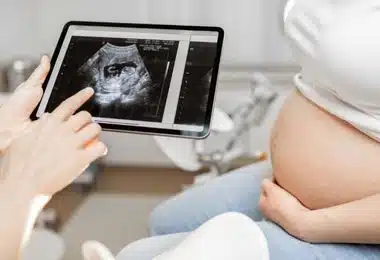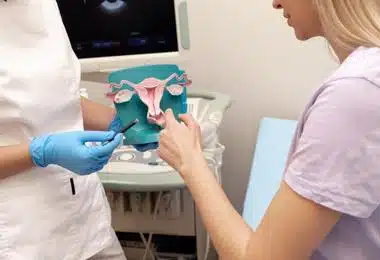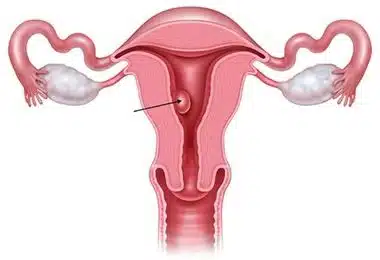
Folic Acid Use in Pregnancy
May 28, 2023
What Is Fetoscopy?
July 1, 2023
Folic Acid Use in Pregnancy
May 28, 2023
What Is Fetoscopy?
July 1, 2023
Polyp Surgery
Tumor-like structures that can be seen in various tissues of the body are called polyps. Polyps can be found in mucous-covered tissues such as the intestine, nose, cervix, and uterus. If the polyps are not intervened, they will grow over time. Growing polyps can lead to distressing conditions in the body.
Polyps are classified according to their structure, size, and root tissue. Polyps, which are mostly benign, are also found to be cancerous. The polyp, which is diagnosed as risky after the doctor's examination, is taken under control with surgery or various treatment methods.

Image-1: Polyp in the uterus.
A polyp is a tumor that arises in the body's cavity organs, usually with an unknown cause. After rooting in the void, it looks like a flesh mole when viewed from the outside. After the polyp formation is noticed, the nearest health institution should be applied.
Cancerous cells can sometimes manifest themselves by forming polyps. The polyp, which is evaluated according to the organ it arises, is usually benign in the esophagus, stomach, and small intestine. While 90% of polyps that occur in the large intestine and uterus contain the possibility of cancer, the remaining 10% are like moles. Although the exact cause of the polyp is not known, surgery should be preferred because the malignant polyp will reduce the quality of life.
What Is Polyp Surgery?
Polyp treatment varies according to the location of the polyp, its size, how many, and the type of polyp. For a polyp that is malignant by the doctor, treatment is started immediately. Although polyp cures have started to be used with the influence of popular culture in recent years, you should not use these cures without consulting your doctor, which can take on a supportive role rather than treatment. You should leave the treatment method and duration to your doctor's control.
If the polyp is malignant or prevents the patient from becoming pregnant, it must be treated. Removal of polyps from the uterus with the help of a surgical procedure is called polyp surgery or polypectomy. Polypectomy, which is a very simple endoscopic procedure, is performed with surgical instruments with millimetric precision. Severe pain is not felt during the procedure.
Hysteroscopic Polyp Surgery
The area where the polyp is located helps the patient to decide on the treatment method and the choice of surgery. Different treatment methods may be preferred for uterine or intrauterine polyps. Hormone-regulating drugs can be used as a temporary treatment method.
When the drug treatment is stopped, the symptoms experienced by the patient return. As a result, drug therapy is not a preferred method as it does not produce a permanent solution. Polyps in the uterus need to be surgically removed. The procedure is performed using sedatives or local anesthesia. The most important point in polyp surgery is to determine the location of the polyp or polyps.
Video-1: Video footage of the removal of a large Endometrial Polyp, which we managed with hysteroscopy.
Optical devices, which have developed as the developing technology finds a response in the medical world, are used in this surgery. In the hysteroscopy method, which is performed by placing surgical instruments into the hysteroscope, the uterus is entered through the cervix. During this procedure, a vaginal camera is used, and the exact location of the polyps can be determined. The polyp is then cut and removed. After hysteroscopy surgery, the patient can be discharged on the day of surgery. After a day of rest, the person can return to his daily life.
What Are the Risks of Polyp Surgery?
Thanks to hysteroscopy, intrauterine polyp surgery, which is one of the very successful operations, can still cause various risks, infections, and allergic reactions. During the treatment of the polyp and the use of imaging devices, the patient is exposed to some radiation. Although it is a low amount of radiation, there is a possibility that the patient will develop uterine cancer over time.
The amount of radiation of the applied treatment methods is very important. If various problems are experienced during the operation or if the necessary hygiene environment is not provided, infection may occur in the patient's body. In case of infection, antibiotics are usually administered. Although there is a small possibility, the possibility of miscarriage may increase after intrauterine polyp surgery.
Depending on the benign nature and type of polyps, the patient may lose fertility. Thanks to the safe and advanced technological methods that have been preferred recently, this possibility is low. Regardless of whether the tissue is benign or malignant, edema may occur in the area where the tissue is taken.
Bleeding may occur after intrauterine polyp surgery. These bleedings occur as thin oozing or spotting. In case the bleeding increases or cannot be stopped, the nearest health institution should be consulted. Allergic reactions may develop in the patient's body due to the tools used during the surgery or the injected drugs. Although the necessary tests are performed before the operation, anesthesia complications may occur due to allergic reactions after the operation.
Before Polyp Surgery
As before every surgery, various tests are performed before the polyp surgery to avoid any problems during the surgery and to increase the success rate of the operation. Before the operation, the patient's complaints are listened to, and the drugs he is using, if any, and their usage patterns are learned. If the person is using blood thinners, he should stop before the surgery for the time recommended by the doctor. In the case of surgery while using blood thinners, it becomes difficult to stop the bleeding.
Before the polyp surgery, the doctor prepares the patient for the surgery in the best way by creating a nutrition plan or various diets if he deems it necessary. Before polyp surgery, routine tests such as blood analysis, urinalysis, and anesthesia control are performed. Although these tests are performed for each patient, the test results are of great importance for the course of the surgery.
Although polyp surgery is performed using advanced technologies, smoking and alcohol use before the surgery is not recommended as smoking and alcohol use before the surgery may cause various problems during the surgery.
After Polyp Surgery
Depending on the size and level of the polyp, intrauterine polyp surgery can take between 5 minutes and 1 hour. After the operation, the patient is kept under control for a while and necessary examinations are made. If there is no problem, the patient can be discharged within a few hours.
Although pain is not felt during the operation because of anesthesia, pain and cramps may occur within a few days after the operation. If the pain increases, the doctor should be contacted. After the polyp surgery, the patient can stand up after about 2 hours and does not have any problems with his mobility.
To eliminate the problems that may occur after polyp surgery, the medications prescribed by the doctor should be taken regularly. After intrauterine polyp surgery, control should be performed to prevent recurrence of tumor formation.
A diet program is given to the patient after the surgery as well as before the surgery. Compliance with the medication and diet program is of great importance for the healing process to progress in a healthy way. It is recommended to wait 7 to 10 days to have sexual intercourse after polyp surgery. After the patient feels good, he can continue his sexual life.
You can also check our article titled "What is a polyp? How is it formed?" to get more detailed information related to the topic.

